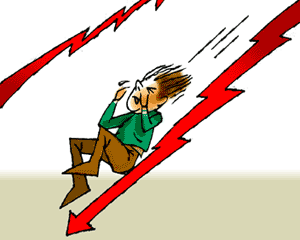 y friend, let's call him Ravi, has an interesting, but common story to narrate.
y friend, let's call him Ravi, has an interesting, but common story to narrate.
When trading in the market one day, he bought 1,000 shares of HFCL. He picked them at Rs 72 each. That translated into a total investment of Rs 72,000.
The next day, it hit Rs 86.40. A neat profit to make in a day! He would have made a profit of Rs 14,400 within 24 hours!
 That's right. I said 'would have'. Unfortunately, he did not.
That's right. I said 'would have'. Unfortunately, he did not.
Why? Because he choose not to sell.
Simply because he thought it would go up higher the next day and he would make some more money. He was expecting it to touch at least Rs 100.
Did it? Nope. Ravi ended up selling the stock at Rs 74.90.
His profit? Rs 2,900.
Not bad, considering he made that much within two days.
But terribly sad when you realise he could have made a profit of Rs 14,400 within a day.
I remember asking him what made him hold on. His answer was straightforward: He was positive the price would go up.
I know what you are thinking, but you are wrong. He did not have access to any information denied to the rest of the traders.
Ah! The world of emotion
It was just greed, dear reader, plain and simple.
Greed can either make or mar an investor's day. It is responsible for quite a few investors losing their shirt in the market.
Now, in case you are under the assumption that I am mercilessly berating my friend for a mistake anyone could commit, let me assure you I am talking about myself as well.
I sinned, too!
Post 9/11, I went short on Moser Baer at Rs 240.
Let me explain. Those who sell first (without owning the shares) and buy later are said to go short on that stock.
They do this because they expect the share price to fall from the level at which they bought it. So they sell at the current rate, expect the price to fall, and buy them again at the lower rate.
Result: a profit because they sold at a price higher than they bought it.
That means I sold the 400 shares of the company at Rs 240 each and now was looking to buy it at lower than Rs 240. I thought I had the golden opportunity to make a fortune of around Rs 24,000 in three flat days.
The price dropped to Rs 178.80 and hit the circuit breaker. When the price of a stock shoots up or drops down by a particular percentage in a day, a circuit breaker is triggered, which stops trading in that stock. This is only for a short period of time or till the end of the day (depending on when it was triggered), and its purpose is to let investors 'cool down' a bit.
To understand how circuit breakers work, read How the stock exchange protects your money.
Those were the days when stocks would hit their upper and lower circuits more times in a day than you would bat your eyelids.
What did I do? I waited.
I thought there was no bottom to any stock in those frenzy-filled selling days after 9/11.
I greedy, plain and simple!
As luck would have it, the stock began its upward journey the very same day it hit the lower circuit of Rs 178.80. And my profits started diminishing every time the stock gained a rupee or two.
Not one to give up, I held on to my 400 shares for dear life.
I parted with them only when the price shot up to Rs 242. I lost Rs 800 on the entire transaction and the brokerage I had to pay was like salt rubbed on my wounds.
How ordinary investors get slaughtered
Greed and fear are the two most common emotions that rule an investor's life.
While it's very difficult to understand an investor's greed quotient when the markets go for a joyride, it is equally difficult to understand his fears when markets spin into a tizzy.
The biggest mistake an investor can make is to go against the market. But it is what happens often.
When market sentiment is high, prices are rising and the bull market is on full swing, investors flock to the market.
And when it inevitably turns bearish and prices come tumbling down, they fail to realise it is cyclical. They panic and sell.
A final word of advice
On buying
It is very difficult to time the markets. But it would be a good idea to stay away when the markets are soaring and the Sensex is climbing every day.
The best way to enter the market is when it has come down (bear market). Buy your shares really cheap and hang on till the next bull run.
Avoid buying when everyone is flocking to the market, and when the only conversation at social dos is which stock everyone is betting on.
When the greed quotient is at its peak (during a bull run), stay away.
On selling
Before entering the market, have a ballpark figure regarding the return you expect. Don't wait forever to sell your profitable holdings when the markets are climbing every other day.
If you have a particular investment target in mind, sell your shares the moment that is reached, even if it is in the short term.
If the prices start tumbling, don't sell because they will tumble more. Hold on. If it is a good company, it will pick up over time.
Do not sell when everyone is panicking.
The best way you can make the market work for you is by following two rules:
- Don't trade. Invest for the long term. Keep a time frame of at least a few years when investing in equity.
- Invest in a company because you believe in it and the business. Don't just go by 'tips'.
If you are doing both, the ups and downs of the market should not impact you.
DON'T MISS!
What's in a share? Money!
Make money with shares
Here's why the Sensex rises
Illustration: Dominic Xavier







